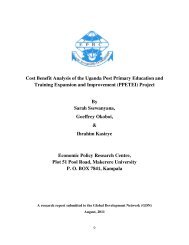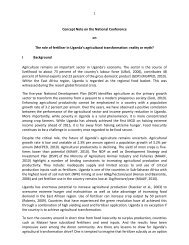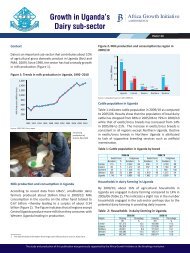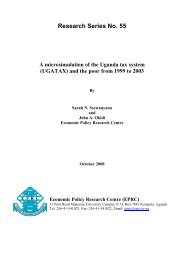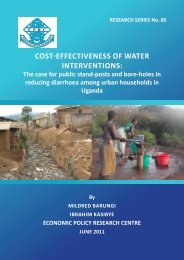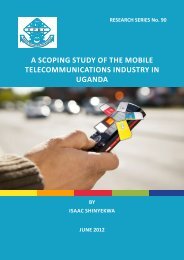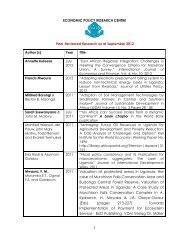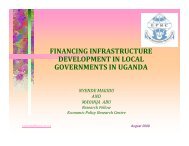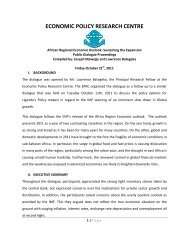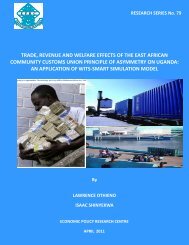The Political Context of Financing Infrastructure Development in ...
The Political Context of Financing Infrastructure Development in ...
The Political Context of Financing Infrastructure Development in ...
Create successful ePaper yourself
Turn your PDF publications into a flip-book with our unique Google optimized e-Paper software.
<strong>The</strong> <strong>Political</strong> <strong>Context</strong> <strong>of</strong> <strong>F<strong>in</strong>anc<strong>in</strong>g</strong> <strong>Infrastructure</strong> <strong>Development</strong> <strong>in</strong> Local Government<br />
<strong>The</strong> Kampala Capital City Act, 2010, is an epitome <strong>of</strong> movement away from the spirit <strong>of</strong><br />
devolution which is at the heart <strong>of</strong> decentralization and empower<strong>in</strong>g <strong>of</strong> citizens to choose their<br />
leaders and these leaders <strong>in</strong> the Local Councils to exercise oversight functions <strong>in</strong> <strong>in</strong>frastructure<br />
development. In this regard, for the first time s<strong>in</strong>ce decentralization was <strong>in</strong>troduced <strong>in</strong> 1993,<br />
members not elected by either universal adult suffrage or <strong>in</strong>directly through colleges have<br />
been <strong>in</strong>troduced <strong>in</strong>to a local council. Section 6(g) <strong>of</strong> the Kampala City Council Act, 2010,<br />
provides that <strong>in</strong> the composition <strong>of</strong> the KCCA Council, there shall be councillors represent<strong>in</strong>g<br />
pr<strong>of</strong>essional bodies namely:<br />
• One councillor represent<strong>in</strong>g Uganda Institution <strong>of</strong> pr<strong>of</strong>essional Eng<strong>in</strong>eers;<br />
• One councillor represent<strong>in</strong>g Uganda society <strong>of</strong> Architects;<br />
• One councillor represent<strong>in</strong>g Uganda Medical Association; and<br />
• One councillor represent<strong>in</strong>g Uganda Law society.<br />
What this shows is that the central government is focused on “captur<strong>in</strong>g” the city council<br />
from the electorate who have over the years persistently largely voted for members <strong>of</strong> the<br />
opposition parties. <strong>The</strong> non-elected members <strong>of</strong> the council enumerated above, will probably,<br />
be handpicked by heads <strong>of</strong> their associations s<strong>in</strong>ce there is no legal provision <strong>of</strong> how they are<br />
supposed to be selected.<br />
Section 17(1) <strong>of</strong> the Kampala City Act 2010, provides that there shall be an executive director<br />
who shall be the chief executive <strong>of</strong> KCCA. Section 17(2) makes it clear that this executive<br />
director shall be appo<strong>in</strong>ted by the president on the advice <strong>of</strong> the Public Service Commission.<br />
<strong>The</strong> unanswered question is whether this executive director is answerable to the Council or<br />
the president. To compound Central government takeover <strong>of</strong> adm<strong>in</strong>istration <strong>of</strong> Kampala City,<br />
Section 5(3) <strong>of</strong> Kampala City Act 2010, stipulates that the Authority is the govern<strong>in</strong>g body<br />
<strong>of</strong> the capital city and shall adm<strong>in</strong>ister the capital city on behalf <strong>of</strong> the central government.<br />
What is ironical however is that the subsequent subsection (4) provides that any enactment<br />
that applies to the district shall, subject to this Act and with necessary modifications, apply to<br />
the Authority. What these legal provisions imply is that whereas Kampala City rema<strong>in</strong>s a local<br />
government, it is directly, adm<strong>in</strong>istered by the central government. Moreover, a M<strong>in</strong>ister <strong>in</strong><br />
charge <strong>of</strong> Kampala City has been appo<strong>in</strong>ted. <strong>The</strong> M<strong>in</strong>ister <strong>in</strong> charge <strong>of</strong> KCCA reports to the<br />
president while the Executive Director reports to parliament. However, the M<strong>in</strong>ister is also<br />
required to make an annual report to parliament.<br />
<strong>The</strong> M<strong>in</strong>ister for KCCA has been given powers to override the decisions <strong>of</strong> the KCCA. Section<br />
79 <strong>of</strong> the Kampala City Act 2010 which stipulates the powers <strong>of</strong> the M<strong>in</strong>ister for Kampala<br />
among others provides that the M<strong>in</strong>ister shall have powers <strong>in</strong> relation to the Authority:<br />
• To vary or resc<strong>in</strong>d any decision <strong>of</strong> the Authority which is <strong>in</strong> contravention <strong>of</strong> any law or<br />
central government policy, with the approval <strong>of</strong> cab<strong>in</strong>et;<br />
26<br />
Economic Policy Research Centre - EPRC





